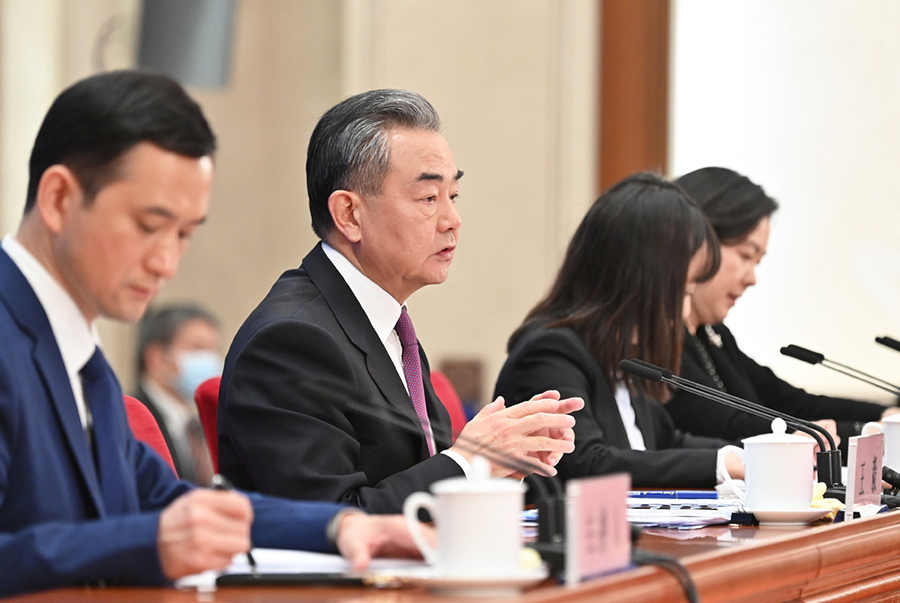
Chinese State Councilor and Foreign Minister Wang Yi attends a news conference on China's foreign policy and foreign relations via video link on the sidelines of the fifth session of the 13th National People's Congress (NPC) at the Great Hall of the People in Beijing, March 7, 2022. [Photo/Xinhua]
This is an editorial from China Daily.
The news conference of State Councilor and Foreign Minister Wang Yi on the sidelines of the annual gathering of the country's top legislators in Beijing on Monday made it crystal clear that China has a strong sense of responsibility and firmly upholds multilateralism.
Answering questions from the media covering almost all the key fields in China's foreign relations, Wang not only displayed his personal charm with his quick-witted responses but also cast light on the vitality of Chinese diplomacy.
Apart from the Ukraine crisis, questions relating to Sino-US relations dominated the news conference. Nearly half of the 27 questions Wang answered were directly or indirectly related to the United States, which appeared 18 times in the transcript of the news conference, in comparison with Russia, which was mentioned 10 times.
Wang summarized the positive statements made by the US leader and different senior officials concerning the US' China policy on various occasions, in which they stated that the US has no intention to seek a new Cold War or to change China's system, and that the revitalization of its alliances is not anti-China, and it does not support Taiwan independence, and the US is not looking for conflict or confrontation with China. Beijing continues to hope that Washington will work with it to reverse the negative development momentum of the bilateral ties. Although those hopes have been repeatedly dashed as these statements have been just verbal assurances that the US has reneged on.
Indeed, as Wang said, the US has been leaving no stones unturned in its attempts to provoke China and force it into a zero-sum game. China is therefore taking all necessary measures to safeguard its core interests and legitimate rights.
Checking the worsening of Sino-US relations is a common desire of the international community and, if it took a step back and reviewed the history of bilateral ties objectively, Washington would realize that it is also in line with the interests of the US.
To reverse the free-falling relations between the two countries, Wang proposed as a prescription that Washington replace its competition-cooperation-confrontation trichotomy in dealing with China with the three principles of mutual respect, peaceful co-existence and win-win cooperation, as many obstacles hindering the development of Sino-US relations could then be overcome.
This harmonious three-principle approach would alter for the better the dynamics of other issues on which Wang answered questions — such as the South China Sea disputes and the Taiwan question, China's relations with its neighbors, the South Pacific island countries and Latin America.
China seeks partners, not allies, and its developing relations with any other parties is by no means to target a third party. While in the eyes of politicians in Washington, differences are reasons for estrangement, conflicts and discrimination, to Beijing, they are reasons for exchanges, cooperation and respect.

 中文
中文





